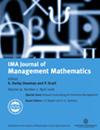Robustness of copula-correction models in causal analysis: Exploiting between-regressor correlation
IF 4.3
3区 工程技术
Q3 MANAGEMENT
引用次数: 0
Abstract
Causal analysis in management and marketing often faces the challenge of endogeneity, which can result in biased estimates when methods that assume independence between regressors and errors are applied. The joint copula modeling approach proposed by Park and Gupta (Marketing Science, 2012, 31(4), 567–586) provides a practical solution to this issue by modeling the joint distribution of endogenous regressors and errors. This paper proposes a generalisation of their approach with an endogeneity correction that involves the exogenous variables. We first show that the estimator by Park and Gupta requires the strong assumption of independence between the endogenous and the exogenous regressors, and suffers from an omitted variables bias when this assumption is violated. We also quantify this bias. The distinguishing characteristic of the proposed approach is that we use a first-stage auxiliary regression to generate copula correction functions by exploiting the informational content of the exogenous variables in a similar spirit as instrumental-based identification. As this first-stage regression does not generate an additional identification problem, is not more restrictive than the Park and Gupta model. The approach is least-squares-based and thus neither requires numerical optimisation nor the search for starting values. Monte Carlo simulations reveal that the proposed approach performs well in finite samples. We demonstrate the practical applicability by reassessing the empirical example in Park and Gupta using the proposed approach.因果分析中 copula 校正模型的稳健性:利用回归器之间的相关性
管理和营销领域的因果分析经常面临内生性的挑战,如果采用假设回归因子和误差之间相互独立的方法,就会导致估计结果有偏差。Park 和 Gupta 提出的联合 copula 建模方法(《营销科学》,2012 年,31(4), 567-586)通过对内生回归因子和误差的联合分布进行建模,为这一问题提供了切实可行的解决方案。本文对他们的方法进行了概括,提出了涉及外生变量的内生性修正。我们首先证明,Park 和 Gupta 的估计方法需要内生和外生回归变量之间独立性的有力假设,而当这一假设被违反时,就会出现遗漏变量偏差。我们还对这种偏差进行了量化。所提方法的显著特点是,我们利用外生变量的信息含量,以类似于工具识别的方式,通过第一阶段辅助回归生成 copula 修正函数。由于这种第一阶段回归不会产生额外的识别问题,因此并不比 Park 和 Gupta 模型更具限制性。该方法基于最小二乘法,因此既不需要数值优化,也不需要寻找起始值。蒙特卡罗模拟显示,所提出的方法在有限样本中表现良好。我们利用所提出的方法重新评估了 Park 和 Gupta 模型中的经验示例,从而证明了该方法的实际适用性。
本文章由计算机程序翻译,如有差异,请以英文原文为准。
求助全文
约1分钟内获得全文
求助全文
来源期刊

IMA Journal of Management Mathematics
OPERATIONS RESEARCH & MANAGEMENT SCIENCE-MATHEMATICS, INTERDISCIPLINARY APPLICATIONS
CiteScore
4.70
自引率
17.60%
发文量
15
审稿时长
>12 weeks
期刊介绍:
The mission of this quarterly journal is to publish mathematical research of the highest quality, impact and relevance that can be directly utilised or have demonstrable potential to be employed by managers in profit, not-for-profit, third party and governmental/public organisations to improve their practices. Thus the research must be quantitative and of the highest quality if it is to be published in the journal. Furthermore, the outcome of the research must be ultimately useful for managers. The journal also publishes novel meta-analyses of the literature, reviews of the "state-of-the art" in a manner that provides new insight, and genuine applications of mathematics to real-world problems in the form of case studies. The journal welcomes papers dealing with topics in Operational Research and Management Science, Operations Management, Decision Sciences, Transportation Science, Marketing Science, Analytics, and Financial and Risk Modelling.
 求助内容:
求助内容: 应助结果提醒方式:
应助结果提醒方式:


